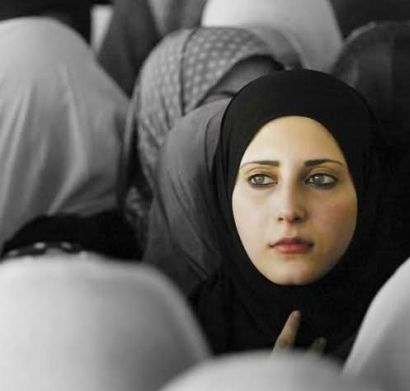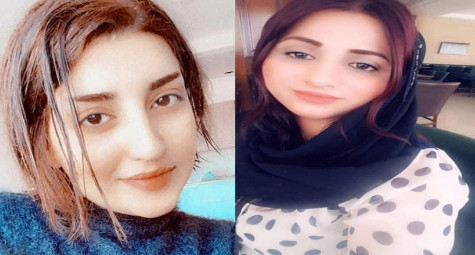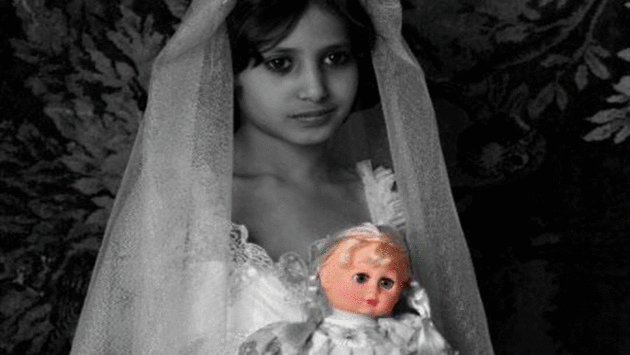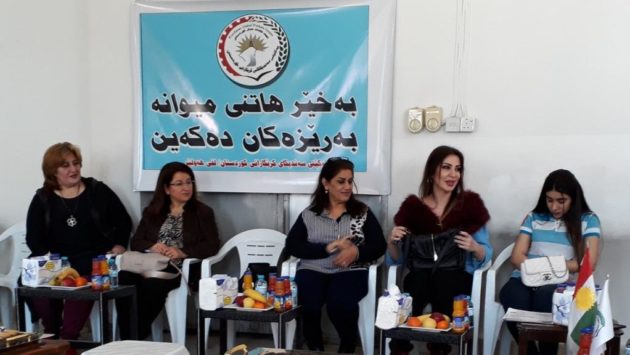Open Letter on Women’s Rights in Iraq – Please Sign
A campaign by the international women’s human rights organization MADRE.
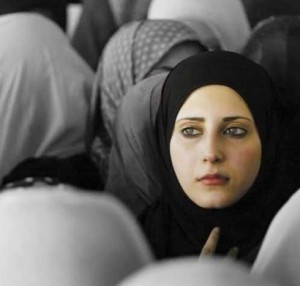 Recently, the United Nations Human Rights Council adopted Resolution S-22/1 sponsored by more than 100 states calling for the Office of the High Commissioner for Human Rights (OHCHR) to dispatch an eleven-person mission to Iraq to investigate human rights violations committed by Islamic extremists—one of the key recommendations MADRE and our partners made to the Council.
Recently, the United Nations Human Rights Council adopted Resolution S-22/1 sponsored by more than 100 states calling for the Office of the High Commissioner for Human Rights (OHCHR) to dispatch an eleven-person mission to Iraq to investigate human rights violations committed by Islamic extremists—one of the key recommendations MADRE and our partners made to the Council.
We commend the Council for taking this action, but also recognize that comprehensively addressing the rights and humanitarian needs of women and girls fleeing ISIL-controlled territories requires addressing pre-existing threats to women and girls, embedded in Iraq’s laws and social norms. We urge the investigative team to therefore consider not only immediate violations committed against women and girls by ISIL, but also the context and conditions that structure women and girls’ vulnerability and undermine their capacity to survive and recover from the crisis.
Please take a moment to sign on to the open letter below calling on the United Nations Office of the High Commissioner for Human Rights (OHCHR) to advise the investigative team to raise critical issues in its dialogue with the Government of Iraq, including impunity concerns for honor killings, withdrawing the pending Ja’afari law, and legally allowing local women’s organizations to provide shelter for displaced families. Please email sign ons to petition@madre.org.
We hope you will consider signing on.
September 24, 2014
Prince Zeid Ra’ad Al Hussein
UN High Commissioner for Human Rights
Office of the UN High Commissioner for Human Rights
Palais des Nations CH-1211 Geneva 10
SWITZERLAND
Your Excellency, Prince Zeid Ra’ad Zeid Al-Hussein,
The undersigned nongovernmental organizations (NGOs) are writing to urge the United Nations Office of the High Commissioner for Human Rights (OHCHR) to prioritize the impact of the crisis in Iraq on women and girls, both while under the control of the Islamic State of Iraq and the Levant (ISIL) as well as when fleeing from violence to central and southern Iraq.
We commend the Office of the High Commissioner for organizing a mission to Iraq to investigate alleged violations and abuses of international human rights law by ISIL. Both ISIL and its rival militias are known to have committed egregious human rights violations and these actors threaten to further erode the rights of Iraqi women and girls. While all Iraqis face daily insecurity due to terrorism and civil strife, women and girls experience additional, targeted abuse because of their gender.
Comprehensively addressing the rights and humanitarian needs of women and girls fleeing ISIL-controlled territories requires addressing pre-existing threats to women and girls, embedded in Iraq’s laws and social norms.
Norms of “family honor” recognized in Iraq’s penal code, which permits honor considerations to mitigate sentences, are a grave threat to women and girls who have been detained or abused by ISIL fighters. Iraqi service providers report high rates of suicide among such women, who face being ostracized and targeted with killing by their family or community in the name of honor. In fact, some Iraqis have called on their Government to bomb the ISIL-controlled makeshift prisons where women are being held, sold and raped, in order to erase the perceived affront to the honor of those communities.
Severe gender discrimination in Iraq’s personal status law also further erodes women’s rights in the current climate. As militias mobilize throughout the country, hundreds of thousands of households have lost male breadwinners. Ensuing financial desperation has induced a rise in forced, temporary and under-aged marriages. Temporary marriages, previously rare, have re-emerged under the growing influence of certain religious leaders. In this controversial practice, women and girls are “married” in the presence of a religious figure for a fixed period of time, which can be as short as several hours. Temporary marriage does not protect women from honor killings if the relationship is disclosed; neither does the man acknowledge his children who are born in such a union. Forced marriages, also on the rise, have led to a spike in suicides, especially by self-immolation, as young women protest non-consensual marriage arrangements.
The pending Ja’afari draft law, proposed prior to ISIL’s incursion, threatens a number of women’s human rights. It includes provisions that would lower the marrying age for girls to nine years old and legalize marital rape by entitling a husband to non-consensual sex with his wife. The draft law would also prevent women from leaving the house without permission from their husband, automatically grant custody for children over two years old to the father in divorce cases, and significantly limit women’s rights in matters of inheritance. Justice Minister Hassan al-Shimmari introduced the draft law to the Council of Ministers on October 27, 2013. It remains pending despite strong opposition from Iraqi civil society, including some religious leaders.
In Resolution S-22/1, the Human Rights Council urges “all parties to protect civilians, in particular women and children, to respect their human rights and to meet their basic needs, which requires providing safe access for humanitarian and medical services to all affected populations.” On September 19, in a statement made by the Secretary-General’s Special Representative for Iraq at the UN Security Council Ministerial Debate on Iraq, Nickolay Mladenov noted that the “pressure on local communities across Iraq is growing” and the continuing influx of 1.8 million displaced Iraqis has created “a massive shelter crisis.” “With winter fast approaching,” Mr. Mladenov said, “immediate measures must be enacted.”
In the absence of Government sponsored services and legal remedies to address gender-based violence, local Iraqi women’s NGOs are at the forefront of providing necessary services. Even before ISIL’s invasion, Iraqi NGOs and women’s rights defenders seeking to assist women and girls encountered regular harassment, arbitrary surveillance, and warrantless searches. Many human rights organizations are forced to operate illegally and clandestinely, especially those who shelter women fleeing violence, which remains illegal for NGOs in central and southern Iraq. Linking this imperative to the creation of lasting positive change requires strengthening the capacity of Iraqi women’s organizations committed to ending gender-based violence and building a rights-based society in which democratic norms, including gender equality, can supplant sectarianism.
For these reasons we urge the investigative team to consider not only immediate violations committed against women and girls by ISIL, but also the context and conditions that structure women and girls’ vulnerability and undermine their capacity to survive and recover from the crisis.
The Council has requested that the Office of the High Commissioner for Human Rights provide technical and capacity-building assistance to the Government of Iraq in the implementation of human rights commitments expressed in its resolution. As the United Nations principal human rights official, the OHCHR acts as a moral authority and a voice for victims and engages in dialogue with Governments to strengthen national human rights protection. It is critical that the OHCHR investigative team engages in dialogue with the Government of Iraq to:
- Amend the shelter law to allow NGOs to run private shelters for displaced families and individuals. Local Iraqi women’s organizations are mobilizing an emergency response to protect people at severe risk as the threat of sectarian violence grows. They are in the best position to reach displaced families and to provide shelter and aid and their efforts must be supported.
- Withdrawal of the pending Ja’afari law that would legalize marriage for girls, aged nine years and older, sanction marital rape and limit women’s rights in custody, divorce and inheritance.
- Direct the newly created fact-finding mission to meet with Iraqi women’s organizations and to include gender issues in its investigation into ISIL, including widespread and systematic use of rape and enslavement.
In bringing these concerns to your attention, we are lending our support to, and pledging our future assistance with, any efforts that you undertake to remedy the plight of women and girls affected by the conflict in Iraq. To this end, we respectfully request that you investigate this matter and take action as deemed appropriate.
Respectfully Submitted,
MADRE
Organization for Women’s Freedom in Iraq (OWFI)
Women’s International League for Peace and Freedom (WILPF)
The Sorensen Center at the City University of New York (CUNY) School of Law
Iraqi Civil Society Solidarity Initiative (ICSSI)
Un ponte per… (UPP)

